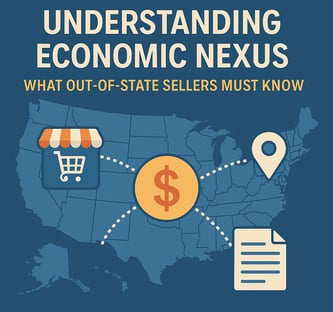State Tax : Understanding Economic Nexus
Faisal S
3/30/20252 min read


In today’s digital economy, your business might be triggering tax obligations in US states you’ve never set foot in. Welcome to the world of economic nexus—a tax rule every modern business owner, especially e-commerce sellers, needs to understand.
What is Economic Nexus?
“Economic nexus” refers to the tax obligation a business has in a state due to sales volume or transaction count, regardless of physical presence. This means you might owe taxes in a state just because you’re selling a lot there—even if you have no warehouse, no office, and no employees in that location.
The Wayfair Decision: A Game-Changer
In the landmark 2018 case South Dakota v. Wayfair, the U.S. Supreme Court ruled that states can require out-of-state businesses to collect sales tax if they meet certain thresholds—even without a physical presence.
This created the foundation for Wayfair analysis—the process of reviewing your sales by state to determine if you have economic nexus and need to collect taxes there. If you’re any of the following, you should regularly evaluate your sales across states:
• E-commerce retailers (Amazon, Shopify, Etsy)
• SaaS and digital service providers
• Wholesalers and distributors
• Remote companies with high-volume sales
Scenario
Let’s say you’re a Pennsylvania-based online business:
• You sell $120,000 to customers in Illinois (IL) with no physical presence there.
• Under Illinois law, that’s enough to create economic nexus.
You must now register with the Illinois Department of Revenue, collect sales tax on IL orders, and file returns accordingly. But here’s the key: You only collect PA sales tax for PA customers, and IL sales tax for IL customers. Most states are destination-based, so the customer’s shipping address determines tax obligations.
What About Foreign (Non-US) Sellers?
Economic nexus doesn’t just apply to US-based businesses. If your business is located outside the United States and you’re selling to customers within the US, you may still be on the hook for state-level tax obligations based on economic nexus.
If you’re a foreign seller (e.g., based in Canada, the UK, etc.) selling into the US and you exceed a state’s economic nexus threshold (for e.g. $100,000 in sales or 200+ transactions in IL), you’re required to register with that state’s Department of Revenue and collect and remit sales tax on transactions in that state.
This applies even if you have no office, warehouse or employees in the US. Most US states base tax obligations on the destination of the sale (i.e., where the buyer is located), so simply having customers in the US can create a tax obligation — even for non-resident businesses.
How to Stay Compliant
Tax laws are constantly changing, but here’s how you can stay ahead:
• Use platforms like Shopify or Amazon — they often handle tax collection based on configured nexus.
• Configure tools like QuickBooks or Xero to apply sales tax by state.
• Automate tracking and filings with tools like Avalara, TaxJar, or Sovos.
• Review your sales by state quarterly to detect any new nexus triggers.
Final Word:
Understanding and managing state tax obligations can be complex, but it’s crucial for avoiding penalties and staying compliant. If you’re making out-of-state sales, it’s time to start tracking your economic nexus—before the taxman comes knocking.
Need help navigating US multi-state tax? FinAce Global is here to guide you through it. Contact us today!
Need help? just ask.
subscribe for more
+1 202 644 1306
© 2025. All rights reserved.
